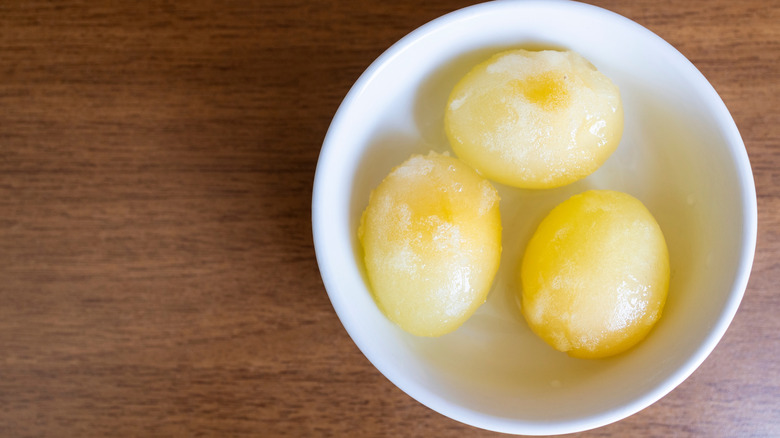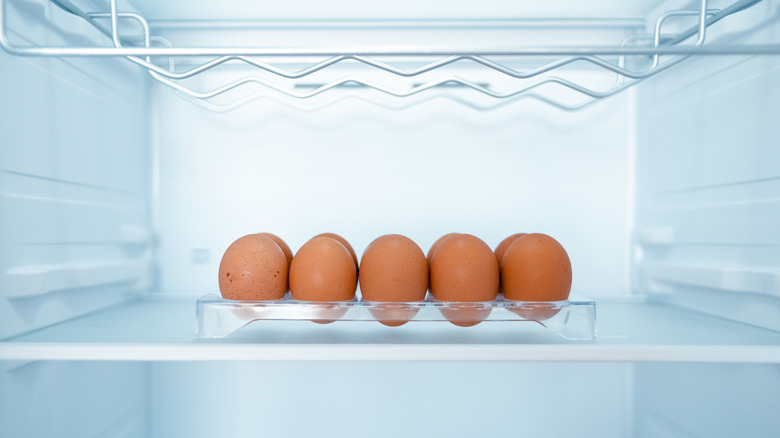What Really Happens To Eggs When You Freeze Them?
Every gymgoer knows that one of the secrets to getting in shape — aside from those intense training sessions — is eggs. Packed with up to 7 grams of protein and with only 66 calories per average medium-sized egg, they're a great post-workout snack that supports muscle recovery. Other than that, eggs are a true kitchen staple. You can fry them, add them to cakes and cookies, or whip them up as a wash for a perfect golden brown color on your baked goods. For a fancier take, you can always turn them into a classic, buttery eggs Benedict. Or, let's say you've done some research and want to try out these 15 hard-boiled egg hacks you'll use forever. There's really no way to go wrong with them. That is, unless you try to freeze them with their shells.
In case you didn't know, eggs can indeed be frozen. If they were on sale and you ended up buying more than you can use, freezing them is a great way to extend their shelf life for up to a year. But just tossing them in the freezer is not the way to go. That's because freshly laid raw eggs can be about 76% water. When frozen with their shells, the water inside expands, causing the shells to crack open. This way, not only do they create a sloppy mess once defrosted, but you also increase the chances of them becoming contaminated. Do you need such egg-stra chaos in your kitchen?
The science behind freezing eggs
While freezing raw eggs might seem harmless at first, there's actually more to it than just the annoying cleanup you think you'll be able to cope with later. Remember those proteins from earlier? Well, most of them — or at least around 60% – are found in the egg whites. Freezing the eggs as they are causes some of these proteins to become unstable and undergo denaturation, an irreversible process in which the proteins unravel from their usual shape. While this doesn't significantly affect their nutritional value, it can lead to the development of unpleasant flavors, which, let's be honest, is the last thing you want when you're preparing creamy scrambled eggs for breakfast.
That said, it's not just the egg whites that undergo texture changes. Yolks are also prone to structural alterations because of gelation. When this happens, egg yolks lose their runny texture and become thick, sticky, and paste-like. This new gel-like consistency is caused by ice crystals that form inside the yolk, ultimately making it difficult to use in most recipes. So, while freezing eggs in their shells is obviously a no-no because they'll break out of them (pun intended), there are still a few tricks you can try out to store them safely without risking spoilage or affecting their taste.
How to properly freeze eggs
Before everything else, you need to make sure that the eggs you're using are fresh. This is because freezing eggs that are close to their expiration date can lead to undesired changes in texture and flavor. If you're wondering how to do that, just follow the simple way to check if your eggs are old, and you're good to go.
Now then, let's dig into those cool freezing hacks. You might want to start by whisking your eggs first. That is, of course, if your idea is to freeze them whole. After thoroughly beating and blending them, grab some freezer containers and pour them in. Adding a pinch of salt to the mix can go a long way, as it helps prevent the yolks from thickening. You can use the same freezing method when you're dealing with some extra yolks only. But, none of this helps much if those containers aren't sealed tightly. While we're at it, marking the number of eggs and the date might come in handy, too.
However, if you only need to store the whites, there's a slightly different technique: Take some unused ice cube trays and pour one egg white in each cube after you separate them from the yolks. Once frozen, you can either transfer them into containers or airtight plastic bags for longer storage. After that, whenever you're ready to make a fudgy chocolate cake or some delicious breakfast muffins, take those eggs out and thaw them in the fridge.


